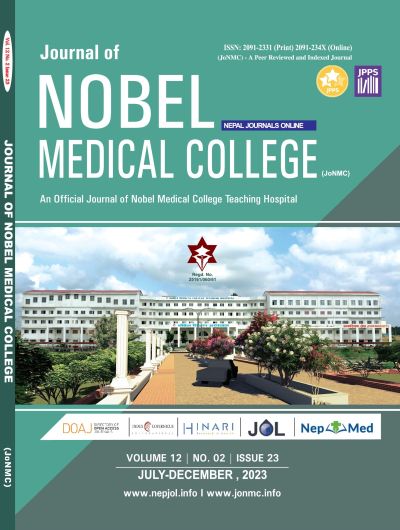Use of Dexmedetomidine as an Adjuvant to Ropivacaine in Supraclavicular Brachial Plexus Block for Patients Undergoing Upper Limb Surgery
DOI:
https://doi.org/10.3126/jonmc.v12i2.61114Keywords:
Analgesia, Brachial plexus block, Dexmedetomidine, RopivacaineAbstract
Background: Various adjuvants have been added in Brachial plexus block but only few studies have reported the use of dexmedetomidine. Alpha 2 agonist Dexmedetomidine used as an adjuvant to the local anesthetic has been suggested to prolong the duration of peripheral nerve block. The objective of this study is to compare the effect adding Dexmedetomidine to Ropivacaine in Supraclavicular brachial plexus block
Materials and Methods: A Quantitative, comparative cross sectional prospective study was conducted in 78 patients randomly allocated into three groups. Group R received 30ml of 0.5% Ropivacaine, Group B received 30ml of 0.5% Ropivacaine + 50mcg of Dexmedetomidine for supraclavicular block and Group Y received 30ml of 0.5% Ropivacaine 0.5% for supraclavicular block and intravenous Dexmedetomidine 50mcg . The onset time to sensory and motor blockade, duration of sensory and motor block and duration of analgesia were recorded.
Results: The onset of Sensory block and motor block was earlier in group B than in group Y and group R. The duration of sensory block and motor block duration was also prolonged in group B when compared with group Y and group R. The duration of analgesia was significantly longer in group B, and group Y when compared to group R.
Conclusion: Dexmedetomidine as an adjuvant to Ropivacaine decreases the sensory as well as motor block onset time, prolongs sensory and motor block duration and also increases the duration of analgesia. The action of Dexmedetomidine most probably is local rather than centrally mediated.
Downloads
Downloads
Published
How to Cite
Issue
Section
License
Copyright (c) 2023 Gunjan Regmi, Kanak Khanal, Batsalya Arjyal, Kumud Pyakurel, Roshan Pradhan, Prasun Rajbhandari

This work is licensed under a Creative Commons Attribution 4.0 International License.
JoNMC applies the Creative Commons Attribution (CC BY) license to works we publish. Under this license, authors retain ownership of the copyright for their content, but they allow anyone to download, reuse, reprint, modify, distribute and/or copy the content as long as the original authors and source are cited.




